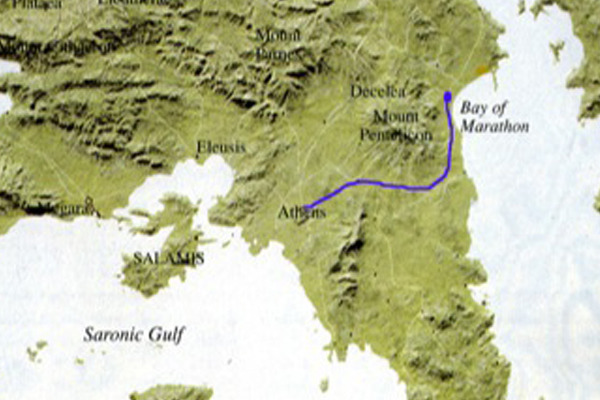The Other Marathon

26 mile route of the Athenians from Marathon back home
The Other Marathon By HERBERT GOLDER
Herbert Golder is Professor of Classical Studies and Editor in Chief of “Arion: A Journal of Humanities and the Classics” at Boston University
This year, we commemorate the 2,513th anniversary of the Athenian victory at the Battle of Marathon. In both substance and in symbol, this victory is one of freedom over tyranny. Had the Persians, who ruled the greatest empire ever known, won the day, the world we now inhabit might never have come to be. Athens would have been but another subject territory of Persia, rather than the birthplace of the liberal habits of mind from which Western Civilization arose. Without pausing to think about that celebrated victory, people the world over know Marathon by the twenty-six mile race named after it, the reenactment by amateur and world-class runners of Pheidippides’ famous breathless run from the battlefield to Athens to announce the Greek victory, after which he instantly dropped dead. But only Plutarch tells this story.
Herodotus has Pheidippides running all the way to Sparta (a good deal further away than Athens) for the purpose of summoning its help – which help was not to be forthcoming. But the real “marathon” was surely those twenty-six miles that the Athenian soldiers ran, after inflicting heavy losses on the Persians by fighting an exhausting and ferocious battle, still fully loaded with armor and carrying all their heavy gear, some of them badly wounded, back to Athens to protect it. There was no time for celebrating or resting. One setback wasn’t likely to deter the King of Persia.
With the Athenian troops at Marathon, and Persia in control of the seas, Athens was an easy target. And so, weary from battle, they ran all the way back. These men weren’t professional athletes. They weren’t even professionally-trained soldiers. They were just incredibly tough – and tough-minded – extraordinary ordinary men – men who believed in something – something worth living for and worth dying for. This Marathon Day, let us think not of the great runner Pheidippides, but of the ordinary men who performed a miracle at Marathon and then brought home and saved a dream called Athens.